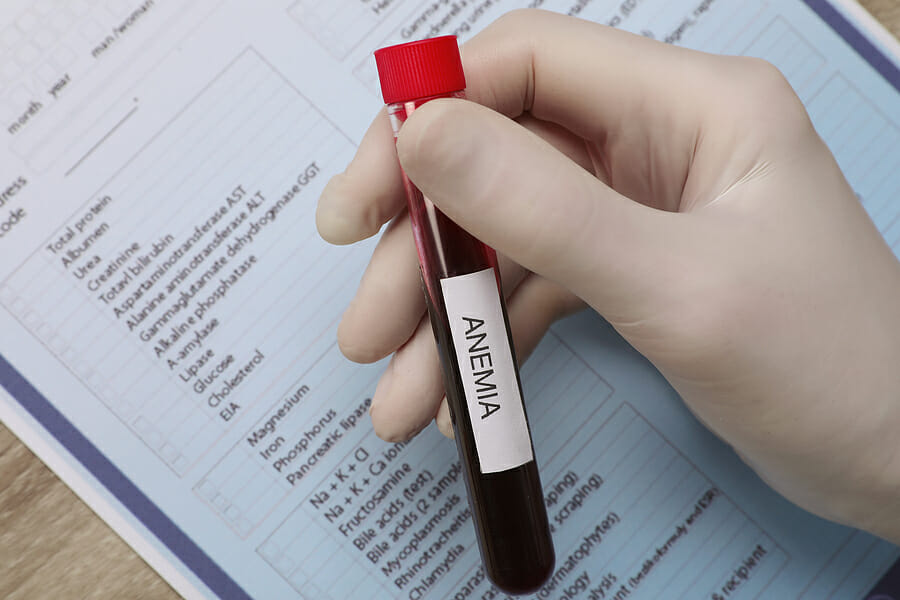Vitamin deficiency anemia occurs in an individual when their body is lacking in healthy blood cells linked to low amounts of folate and vitamin B-12.
Symptoms
Table of Contents
Vitamin deficiency anemia isn’t something that just develops overnight; it slowly develops over the course of a few months and can even take years to develop. Initially, the symptoms and signs are fairly subtle but become more noticeable as the deficiency gets worse. Some of the symptoms of vitamin deficiency anemia are:
- Shortness of breath
- Muscle weak weakness
- Dizziness
- Weight loss
- Changes in personality
- Forgetfulness
- Confusion
- Numbness or tingling sensations
- Pale/yellow skin
Some of these symptoms are mild and can be confused with other diseases and disorders, while others are more prevalent and serious.
Causes
This form of anemia occurs in individuals who don’t consume enough vitamin B-12 and folates or whose bodies have difficulty absorbing them.
Vitamin B-12
There are many different factors that can contribute to a vitamin B-12 deficiency.
One of these factors is diet. Vitamin B-12 is naturally found in some foods like eggs and meat, which means individuals who don’t consume these types of food are lacking in this vitamin and may need supplements.
There is another form of anemia, pernicious anemia, that occurs when the body attacks specific cells in the stomach that absorbs vitamin B-12, called the intrinsic factor. Without this protein, the vitamin cannot be absorbed by the body.
Some problems that involve the intestine, like Crohn’s disease and celiac disease, can cause the organ to be unable to absorb vitamin B-12.
Folate
Folate is also known as vitamin B-9, and it is a nutrient that is commonly found in leafy green vegetables and liver. This deficiency can happen when individuals cannot absorb it from food or don’t eat foods with the nutrient.
Factors like intestinal diseases, prescription drugs, and excessive alcohol consumption can cause issues with the absorption of folate, and those who are pregnant or undergoing dialysis have an increased demand for the nutrient. Because countries have now added folate to various food products, like bread and pasta, folate deficiencies are less common.
Potential Complications
Being deficient in vitamin B-12 or folate can increase one’s risk of various health problems.
- Pregnancy Complications: When the fetus doesn’t receive enough folate from the mother, it can develop various birth defects along the spinal cord and brain.
- Gastric Cancer: Because of pernicious anemia, the body cannot absorb B-12, which can increase one’s risk of developing intestinal or stomach cancers.
- Nervous System Disorders: If left untreated for too long, a vitamin B-12 deficiency can cause neurological problems, like tingling in the hands and feet and issues with balance. The vitamin is essential for healthy brain function, so lacking it can also lead to forgetfulness and confusion.
Diagnosis
When diagnosed, one will provide a medical history, have blood samples taken, and perform a physical exam. The doctor will also look for symptoms of anemia and take into consideration any information you provide them about your diet and medications.
There are various tests the doctor will run on your blood, like ones that check the number and appearance of blood cells, ones that look for antibodies to the intrinsic factor, and the presence of vitamin B-12 and folates.
Anemia Treatment
When diagnosed with vitamin deficiency anemia, treatment involves doses of the vitamin the individual is lacking.
Vitamin B-12 treatments involve:
- Muscle or skin injections
- Pills
- Liquid
- Dissolving tablet
- Nose gel
- Sprays
Folate medications are typically in pill form but can also be delivered intravenously.
Those whose deficiency is caused by pernicious anemia will need B-12 delivered in an injection and may need treatment for the rest of their lives.
There are also vitamin patches that can be used to deliver vitamins through the skin. The best vitamin patches will include multiple vitamins.

Prevention
Fortunately, vitamin deficiency anemia can be prevented. All one has to do is choose a healthy diet with a variety of foods. Foods that are rich in vitamin B-12 are eggs, cereals, dairy products, and different types of meat like chicken, beef, and liver.
Folates are found in broccoli, lima beans, asparagus, and spinach, as well as fruits like oranges, bananas, and strawberries. Countries have also added folates to grain products and other foods.
Image Source: BigStockPhoto.com (Licensed)
Related Categories: Health, Reviews








